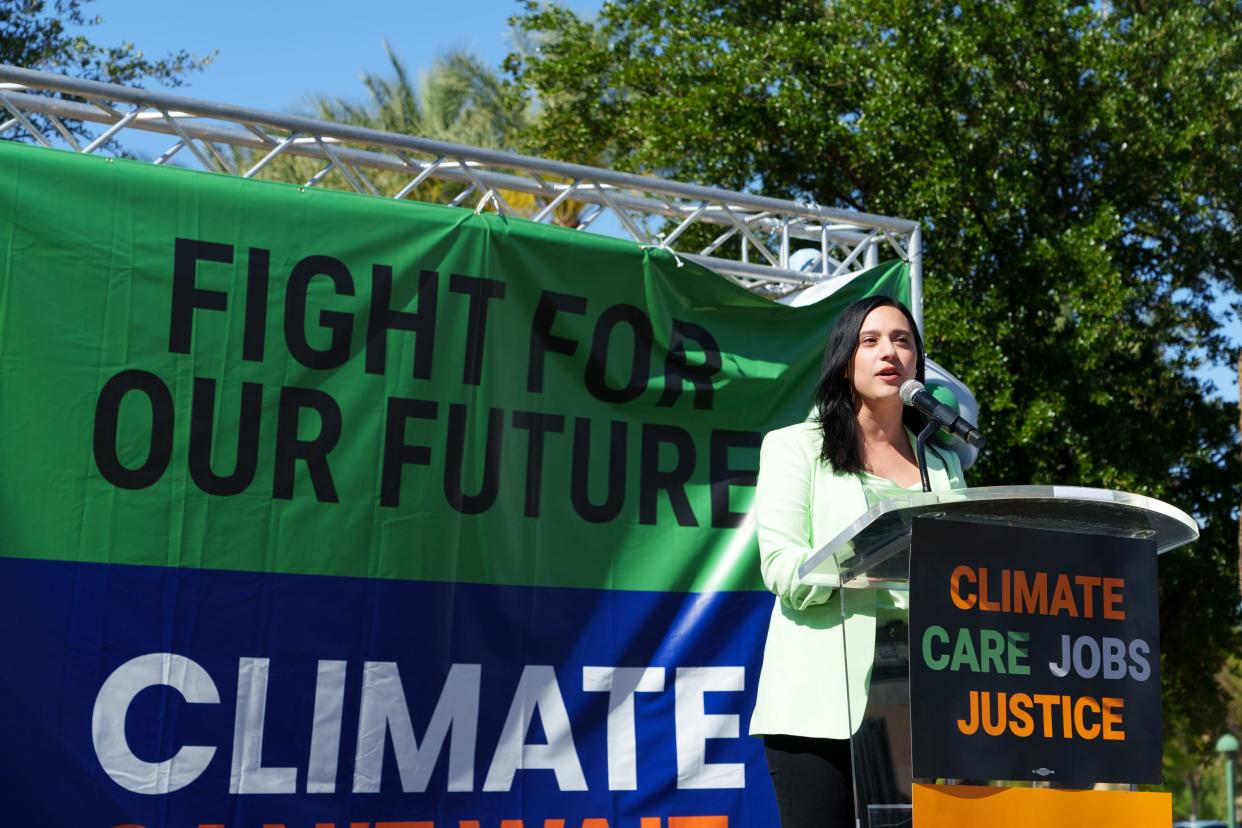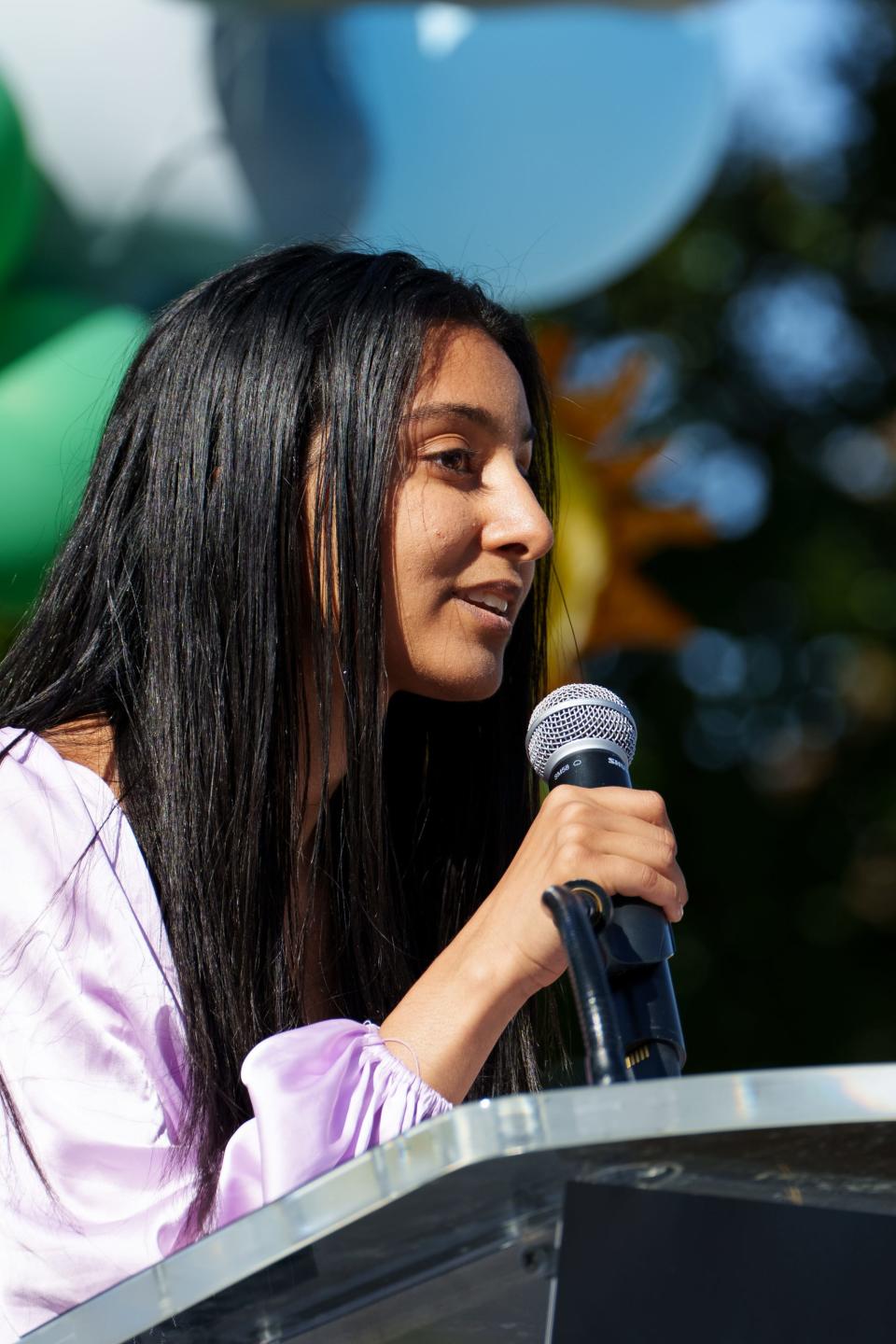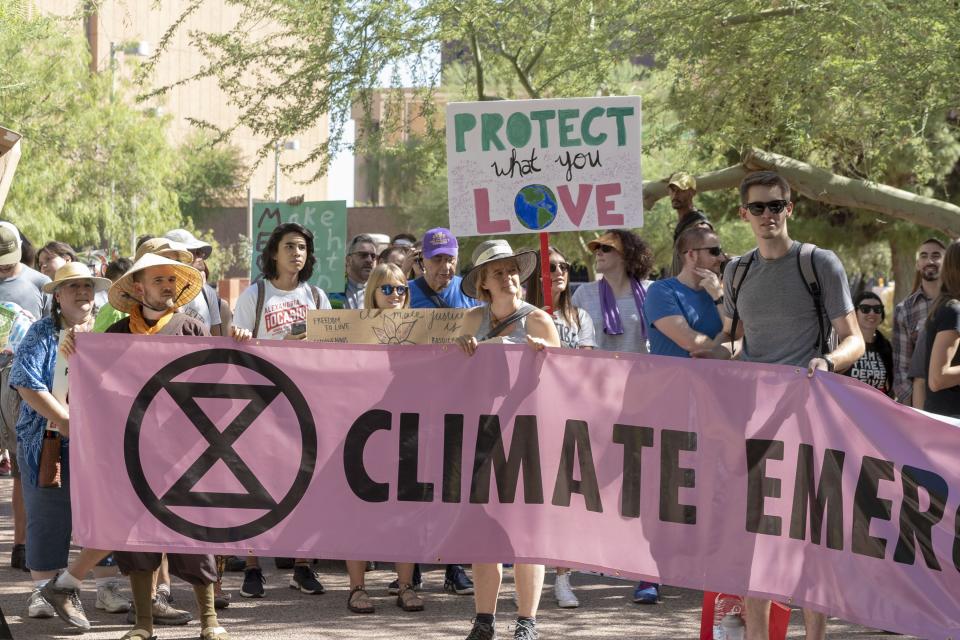Democracy can lead to climate change solutions, but it may be up to states to act first

- Oops!Something went wrong.Please try again later.
- Oops!Something went wrong.Please try again later.
If ever there was an individual permanently stationed at the intersection of democracy and climate change in the public consciousness, it's probably former U.S. Vice President Al Gore.
In 2006, the documentary film "An Inconvenient Truth" showcased Gore's efforts to educate people about the reality and consequences of global warming, featuring a slide show of information on climate change that Gore estimated he had presented to worldwide audiences more than 1,000 times at that point.
The film was, by most measures, a success. It premiered at the Sundance Film Festival, then held openings in New York City and Los Angeles. It won two Academy Awards and became the 11th-highest grossing documentary film to date, pulling in $24 million at U.S. box offices and another $26 million internationally.
But it didn't inspire the kind of action to slow globally rising average temperatures the vice president had hoped.
Sixteen years later, Gore is still at it, making public appearances to try to motivate action against climate change and all the havoc it will — and at this point already has — wreak around the world in the form of stronger storms, larger wildfires, exacerbated droughts and flooding, deadly temperatures and stressed agricultural systems.
Phoenix rising: Phoenix isn't what it once was because of climate change. But it's not too late to save it
Last week, Arizona State University held its inaugural conference on "Democracy and Climate Change," hosting two full days of panel discussions on topics ranging from how the U.S. Constitution influences climate action, to the challenge of fake news, to the necessary role of Indigenous communities in policy decisions. Gore joined Tuesday night via Zoom as the keynote speaker. (Video recordings of all talks are available on ASU's conference website.)
"I'm here not simply to talk to you. I'm here to recruit you. We need you badly," Gore told more than 200 people gathered on campus and online for the talk. "As I've said, we have the solutions we need right now to take action to reduce emissions, transition to cleaner energy, improve lives and communities around the world. We can be successful in this fight."
Distractions, diversions and money hinder democracy
Political will is itself a renewable resource, Gore continued, seeking to convince listeners that they have an important role to play in a democratic approach to climate solutions.
"It's as if we can flip a switch, and we can do this," he said.
Sounds easy enough. But one obstacle to successful climate action Gore said he has witnessed over the decades is a lack of commitment, focused effort and confidence among members of the general public that they can make a meaningful difference. This widespread apathy left the door wide open for misinformation and private interests.
Climate solutions: We can’t purchase our way to a cooler climate, experts say. Not even on Earth Day
"We live in a culture of mass distraction, where people don't feel as though they have the time to participate in their democracy, and are overwhelmed by the amount of trivial information designed to capture their attention," Gore said. "And when average citizens disengage from the process of democracy, moneyed interests are quick to step in and fill that void when it comes to the climate crisis."
The corrupting role of money in politics has badly hindered the political process, Gore said. Even though the overwhelming majority of Americans are in favor of expanding infrastructure for renewable energy sources like wind and solar, the transition away from fossil fuels that reports from the Intergovernmental Panel on Climate Change have repeatedly said is essential, has been slow.
The latest from the IPCC: Climate experts say the world 'is at a crossroads,' but offer hope with concrete actions
So what is standing in the way of democracy doing what it is supposed to do to represent demands of the majority by adopting aggressive climate action?
Panelists at ASU's conference on democracy and climate change last week say it might be the U.S. Constitution.

Is the U.S. Constitution holding back climate action?
The U.S. Constitution is one of the strongest in the world and has protected our democracy for 200 years, said Stefanie Lindquist, a professor at ASU's Sandra Day O'Connor College of Law and executive director of the Center for Constitutional Design, who moderated a panel at ASU's conference last week titled "Is the Constitution the Problem?"
It's also one of the most difficult constitutions in the world to amend.
The rigidity of the U.S. Constitution can be both a boon and a burden to addressing environmental issues. On the one hand, federal regulation has protected access to clean air and water, national parks and the persistence of biodiversity in ways that developers, corporations and monied interests have not always liked.
More: The EPA released state-specific emissions reports. Arizona isn't on the list
But when it comes to global emergencies like pandemics and climate change, aspects of our constitutional system can sometimes stand in the way of timely action.
The electoral college, for example, can mean that rural states with strong oil interests but relatively low populations have outsized representation in Congress. Campaign finance rules that permit unrestricted, anonymous donations can enable fossil fuel tycoons to buy political influence and stifle change, according to Troy Rule, also a professor in ASU's College of Law who participated on a related panel last week.
“We have all of these different elements of our constitutional system and pretty much everyone agrees all of those things are valuable," Rule said. "They’ve proven valuable for 200 years. But in some ways they can prove to be an impediment to climate."
Richard Revesz, a professor at the New York University School of Law and director of the American Law Institute, said during last Tuesday's panel that the elephant in the room is something that "is not really a constitutional doctrine, but is informed by constitutional ideas."
"The current real challenge to climate change regulation is something that we've never thought of as a serious thing until a few years ago, called the major questions doctrine," Revesz said.
It has to do with Congress limiting the amount of regulatory power that any one governmental agency has over things like greenhouse gas emissions. The current Supreme Court has shown a reluctance to grant any agency the type of additional influence it would need to mandate things like vaccines or carbon cuts, Lindquist explained.
“What the court might say is ‘agency, you are taking on a major problem and there is no way congress, however broad they wrote the statute, could have contemplated your acting in such a broad and far-reaching way,'" she said. "For an agency to act on those problems requires a very specific mandate and most agencies don’t have that mandate."
With a two-thirds vote required, the probability of a constitutional amendment to address climate change passing is "slim to none." Over the course of U.S. history, only 27 constitutional amendments have passed. But state constitutions, Lindquist says, "get amended all the time."
And therein lies a democratic opportunity to address climate change.

Enacting change might be more of a local and a private fight
Climate action, which has not historically been a top priority for conservative states who favor state governance over federal control, may be something of a "state's rights" issue.
Experts at ASU's conference last week pointed out that, because local elections happen more often than national elections and state constitutions are easier to amend, political turnover and change that matches the urgency of the climate crisis might be more possible at the local level — if residents get involved and demand it.
“Linking democracy to climate change is not just a random linkage," Lindquist said. “Because climate change is a long term problem that unfolds incrementally over years, one of the challenges with democracy is that we elect people for short terms, two or four years."
Rule, who has authored books on wind and solar power, says Arizona has a huge opportunity to pursue renewable energy independence if it can get organized to vote state officials aligned with local fossil-fuel-based utility companies out of office.
"In Arizona, if we could just use our solar resources, which are some of the best in the world, that would be a great thing for us," Rule said. "The photons from the sun come down all day onto Arizona for free."
Another panelist, Michael Vandenbergh, encouraged conference attendees to bypass limitations of the U.S. Constitution by supporting companies that make progressive climate choices.
"It will be very difficult for expansive interpretations of existing statutory authority to survive Supreme Court review for the foreseeable future," said Vandenbergh, who is chair of the Vanderbilt University Law School and directs the Climate Change Research Network. "So what I want to do is suggest that there are ways to move beyond this."
He sees positive, voluntary change happening in the corporate world, with some companies choosing to adopt climate-forward, sustainable practices because it's what their customers demand, which makes it profitable.
Solar energy: The power of the sun, of the people and of politics. The climate depends on all 3
As a career politician and one of the earliest and most earnest voices in the climate fight, Al Gore might be the first to say that not all problems can be solved on the national stage. He held the office of Vice President of the United States from 1993 to 2001, but made insufficient progress on one of his signature issues.
Had Gore not narrowly lost the 2000 presidential race to George W. Bush in the electoral college (though he won the popular vote), the concentration of greenhouse gases in the atmosphere might be lower today. But constitutional obstacles to climate action highlighted by experts at ASU last week suggest there would have been challenges regardless.
The good news, advocates say, is that domestic progress is not all about federal action. States play a role, as do education and public engagement in the democratic process. In 2007, Gore and the IPCC were jointly awarded the Nobel Peace Prize "for their efforts to build up and disseminate greater knowledge about man-made climate change, and to lay the foundations for the measures that are needed to counteract such change."
He hasn't stopped trying to recruit you since.
Joan Meiners is the Climate News and Storytelling Reporter at The Arizona Republic and azcentral. Before becoming a journalist, she completed a Ph.D. in Ecology. Follow Joan on Twitter at @beecycles or email her at joan.meiners@arizonarepublic.com.
This article originally appeared on Arizona Republic: Is the U.S. Constitution helping or hindering the climate fight?

